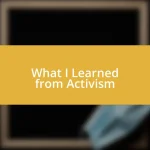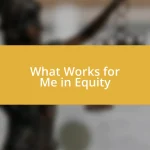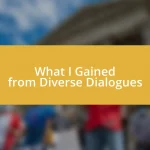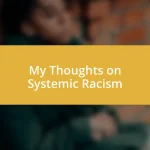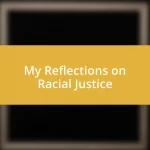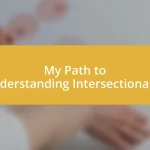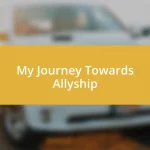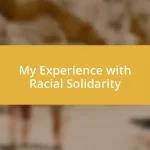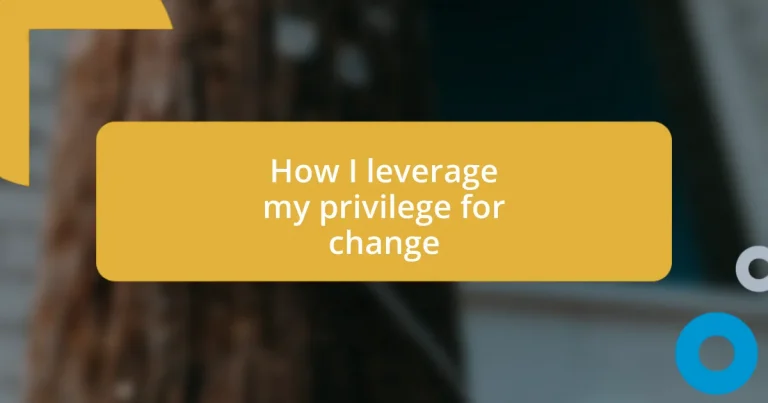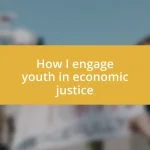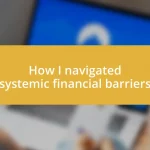Key takeaways:
- Privilege can create unseen advantages that shape opportunities, influenced by social connections and financial backgrounds.
- Recognizing personal privilege encourages proactive engagement in uplifting others and addressing systemic inequalities.
- Building alliances and collaborating with organizations amplifies the impact of community initiatives, fostering trust and shared goals.
- Measuring the impact of actions extends beyond quantifiable results; personal stories and long-term change metrics are crucial indicators of success.
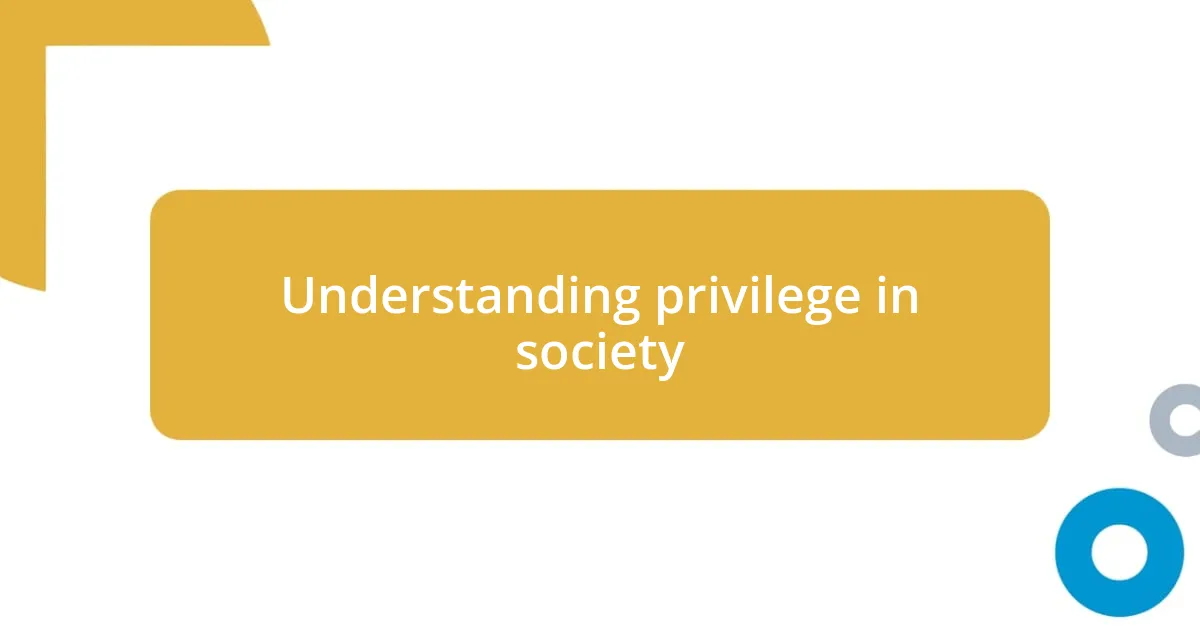
Understanding privilege in society
Privilege can often feel like an invisible shield that protects me from certain challenges and hardships that others face. Growing up, I noticed that when I applied for jobs, my social connections—ones I hadn’t consciously built—often opened doors for me. It made me wonder, how many talents are overlooked because someone doesn’t have the same connections?
I remember a moment during a college class when a fellow student shared their struggle with financial instability while pursuing their degree. It struck me how my financial background had never made such demands on my focus and emotional energy. This experience led me to reflect on how privilege is not just about material things; it can shape one’s confidence and outlook on life in profound ways.
Engaging with the concept of privilege forces me to confront uncomfortable truths about societal structures. Have I ever taken a step back to recognize how my circumstances contribute to my opportunities? In doing so, I realize the importance of using my position to uplift others, turning my awareness into action rather than silence.
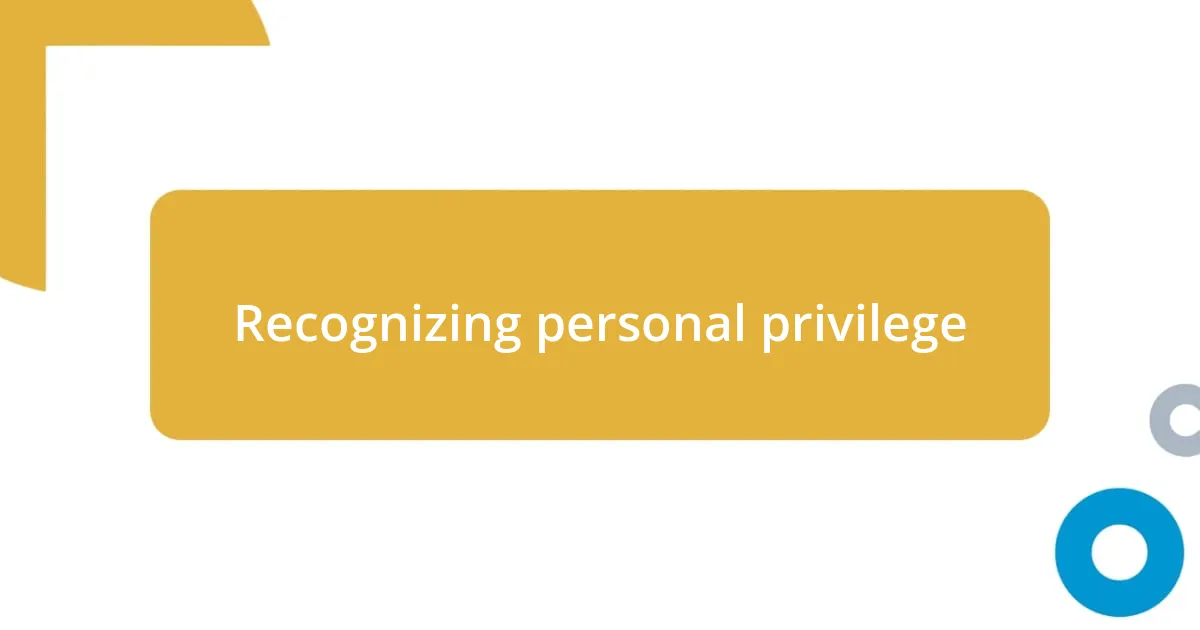
Recognizing personal privilege
Recognizing personal privilege is a journey of self-discovery that can sometimes be challenging. I remember a time when a friend shared her experiences as a single mother, juggling work and childcare. Listening to her made me reflect on how my upbringing—filled with support from my family—allowed me to focus on my studies and career aspirations without the overwhelming stress of financial instability. It really highlighted how privilege isn’t just about what I have; it also influences the choices I can make.
In conversations about privilege, I often find myself realizing that it extends beyond just socioeconomic status. There was a workshop I attended where we discussed race, gender, and sexual orientation. Hearing stories from diverse perspectives opened my eyes to biases I hadn’t personally faced. It was a poignant reminder that acknowledging my privilege doesn’t diminish my struggles; it merely contextualizes them within the broader societal framework.
Taking the time to reflect on my privilege has nudged me toward being more proactive about creating change. During a volunteering session, I felt a sense of responsibility as I engaged with individuals whose experiences were vastly different from mine. This connection sparked an urge to share my opportunities with others, leading me to advocate for those who may not have the same platform. Personal privilege isn’t just something to recognize; it’s a call to action for solidarity and support.
| Aspect of Privilege | Personal Reflection |
|---|---|
| Social Connections | Facilitated job opportunities without awareness of effort |
| Financial Background | Allowed for uninterrupted focus on education and personal growth |
| Diverse Perspectives | Hearing stories that expanded my understanding of societal biases |
| Engagement in Community | Inspired an urge to use my advantage to uplift others |
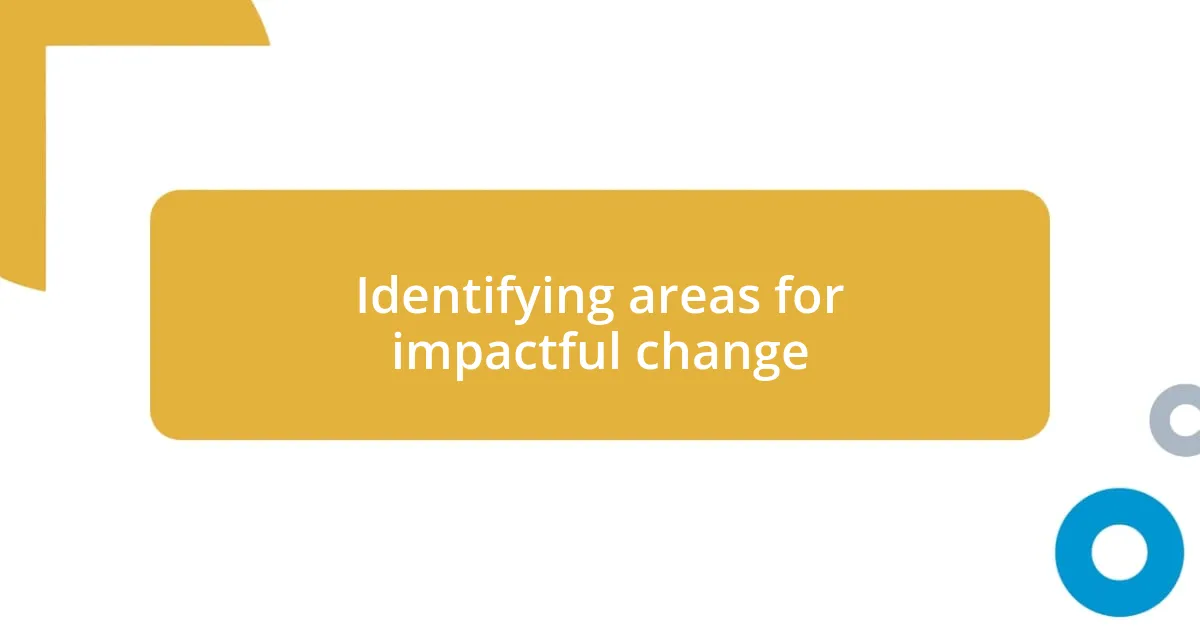
Identifying areas for impactful change
Identifying impactful areas for change involves a conscious examination of the systems and communities around us. I often find myself reflecting on the moments where I’ve seen a gap between those who are thriving and those who are struggling. For instance, I vividly recall volunteering at a youth mentorship program where many kids lacked access to resources. Witnessing their passion, paired with the barriers they faced, ignited a powerful realization in me: it’s crucial to focus my efforts on education and mentorship initiatives, as these can create ripple effects in their lives.
To truly harness the potential of my privilege, I think about specific domains where I can make a meaningful impact. Here are some areas I’ve zeroed in on based on my observations:
- Education Access: Connecting with local schools to offer tutoring and resources to underprivileged students.
- Job Opportunities: Actively sharing job openings or internship opportunities within my networks to benefit those from marginalized backgrounds.
- Community Health Initiatives: Supporting food banks or health drives that address the disparities in healthcare access within my community.
- Advocacy: Raising awareness on issues affecting minority groups through social media or community forums to amplify their voices.
By focusing on these areas, I feel empowered to transform my privilege into a force for good. Each small step, when compounded, can lead to significant change.
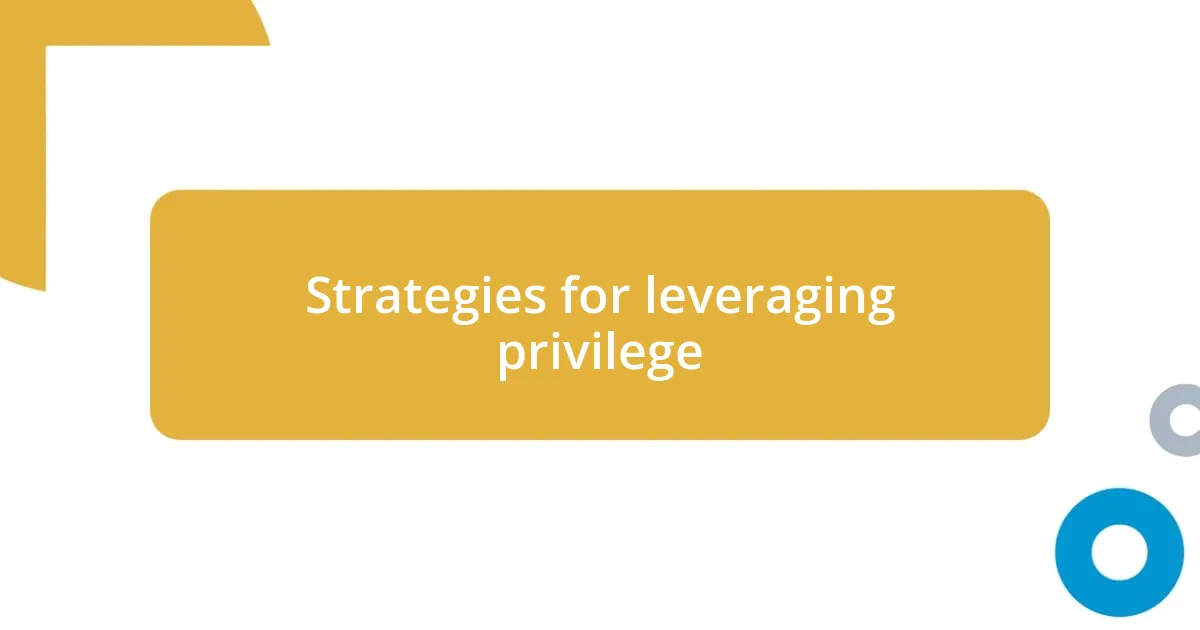
Strategies for leveraging privilege
One effective strategy I’ve found is using social connections to open doors for others. I remember one time when a friend was searching for job opportunities after graduating. I reached out to my network and connected her with someone in my field. That simple act—just sharing a contact—changed her trajectory. It made me realize how easy it can be to use my social capital to uplift others, and it sparked a deeper commitment in me to keep doing this regularly.
I believe that leveraging financial privilege can also be incredibly impactful. There are moments when I reflect on my own educational journey, which was sometimes supported by financial aid. A few months ago, I decided to sponsor a scholarship for local students who show promise but lack resources. I’m passionate about investing in future leaders. It feels like a direct way to exchange some of my privilege for opportunities that these young talents deserve. It’s those palpable moments of giving that fill me with a sense of purpose.
Engaging in community service is another powerful way to leverage privilege for change. I recall volunteering at a community garden; it not only provided fresh produce but also became a gathering place for families. Seeing children play while their parents learnt about healthy eating inspired me to think about other ways to facilitate community connections. Questions like, “What else can we create to elevate community welfare?” push me to explore ideas like workshops for essential life skills or wellness programs. It’s about transforming my privilege into actions that resonate and inspire real change.
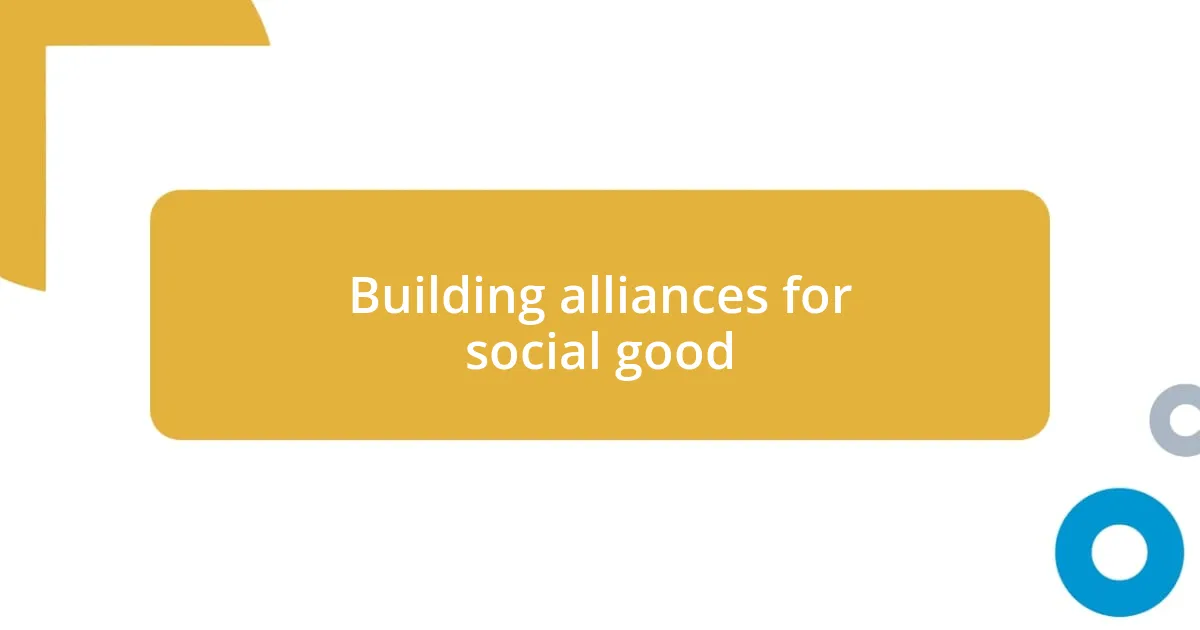
Building alliances for social good
Building alliances for social good is a journey I deeply value. I once participated in a collaborative project where various organizations united to tackle food insecurity in our city. Each group brought unique strengths to the table, from logistics to community outreach. Observing how our combined efforts created a broader impact made me realize that working together amplifies our individual capabilities. It’s fascinating to think: how much more could we achieve if we continued to build these kinds of alliances?
In my experience, forming these alliances often starts with open conversations. I remember attending a community meeting focused on addressing mental health resources. Many voices shared their needs and perspectives, and it struck me how vital it is to listen actively. In that space, I found new friends and allies, passionate individuals who were eager to collaborate on initiatives. I think about this often—what if we approached every engagement with a mindset of partnership? The potential for transformation is limitless.
One vivid moment stands out: joining a coalition for affordable housing. My role was to bridge connections with local businesses willing to support our cause. I felt a mix of excitement and responsibility, understanding that each conversation could lead to real change for families in need. It’s incredible how relationships can pivot into actions that genuinely affect lives. I always ask myself, “How can I expand my circle and invite others into this important work?” Building alliances is about cultivating trust and recognizing that together, we’re capable of so much more than we can imagine alone.
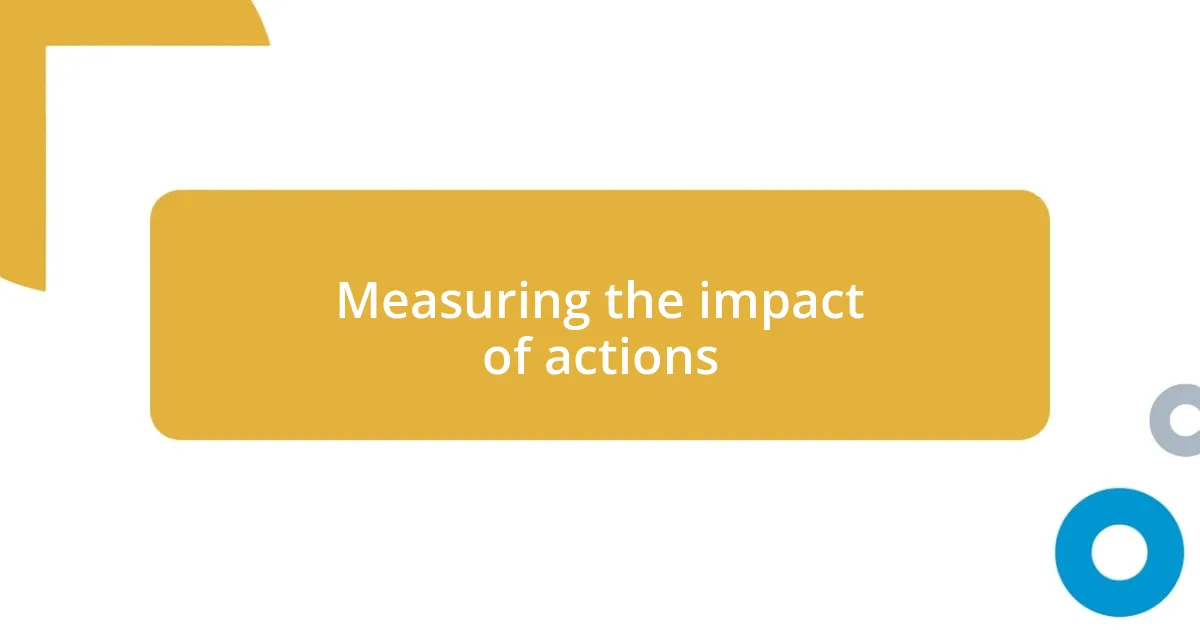
Measuring the impact of actions
Measuring the impact of actions can sometimes feel elusive. I remember organizing a charity run where participants were encouraged to raise funds for local shelters. After the event, I was amazed to see the total contributions far exceeded our expectations. It struck me how quantifying donations wasn’t just about numbers; it was a reflection of community engagement. Were people excited enough to share the cause with their friends? The enthusiasm that spread felt like a tangible measurement of change, one that reinforced my commitment to these initiatives.
Another dimension to consider is the feedback we get from those we intend to help. When I started a mentorship program for at-risk youths, I set up regular check-ins. The stories I heard were powerful—one young girl expressed how a simple conversation shifted her perspective on education. Hearing her say, “Your guidance made me believe I could be more,” reinforced my understanding of success. Isn’t it fascinating how personal testimonies can serve as impactful metrics for the work we do? Those moments of connection remind me that measurable change goes beyond statistics; it’s found in the hearts and minds we’ve influenced.
I’ve found that tracking long-term change can be equally illuminating. After several years of supporting a local nonprofit that focuses on literacy, I took part in an evaluation of their progress. The rise in reading levels among children was impressive, but what really struck me was the ripple effect it created. Parents began to participate more actively in their children’s education, showcasing a change in community dynamics. I often ask myself, “How do we define success?” These experiences have taught me that while short-term metrics are valuable, the enduring transformations we foster in people’s lives are, ultimately, the most significant indicators of our impact.
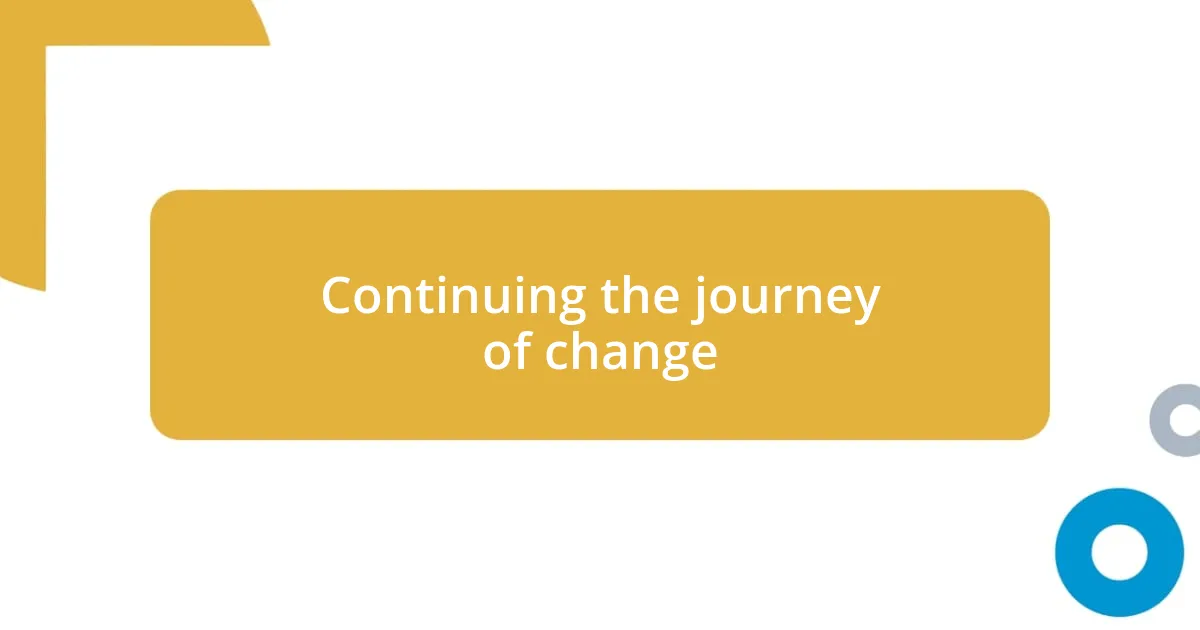
Continuing the journey of change
Continuing the journey of change is not about a destination; it’s a constant evolution. I recall a time spent volunteering at a community garden. While digging in the soil and planting seeds, I felt a strong connection to the ground and to the people around me. This experience taught me that nurturing change requires patience and continual effort. Isn’t it interesting how something as simple as gardening can serve as a metaphor for growth in our communities?
As I reflect on my journey, I realize how crucial it is to remain adaptable. I once attended a workshop on social justice, where the facilitator encouraged us to share our setbacks as much as our successes. I was surprised by the collective sigh of relief that filled the room; acknowledging our struggles fostered trust and collaboration. It dawned on me that vulnerability can be a powerful tool in our ongoing quest for change. How often do we allow ourselves to be real in our pursuits?
I also believe in the importance of education as a pillar of continuing this journey. A few years ago, I joined a group that focused on workshops for civic engagement tailored to underrepresented communities. Witnessing participants gain confidence in voicing their perspectives was transformative. I remember one young woman, who initially hesitated to speak up, sharing her vision for local improvements. Watching that spark ignite in her was a reminder that the journey of change is collective; we lift each other as we climb. How can we create more spaces where voices are amplified and celebrated?
